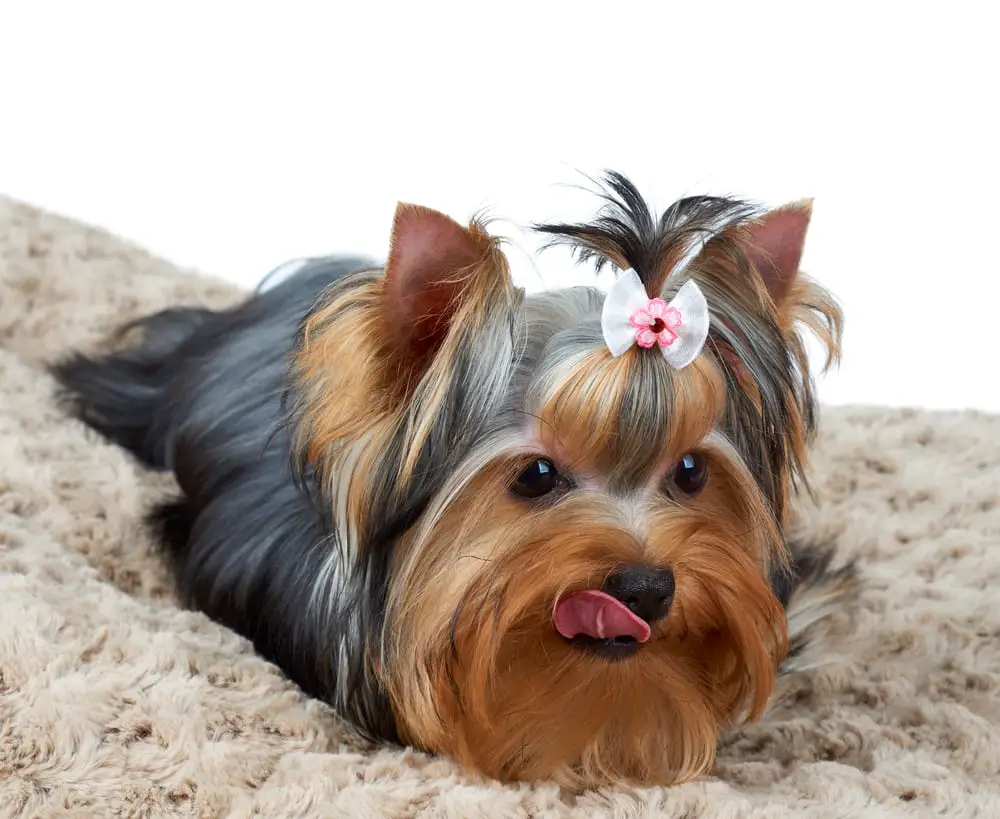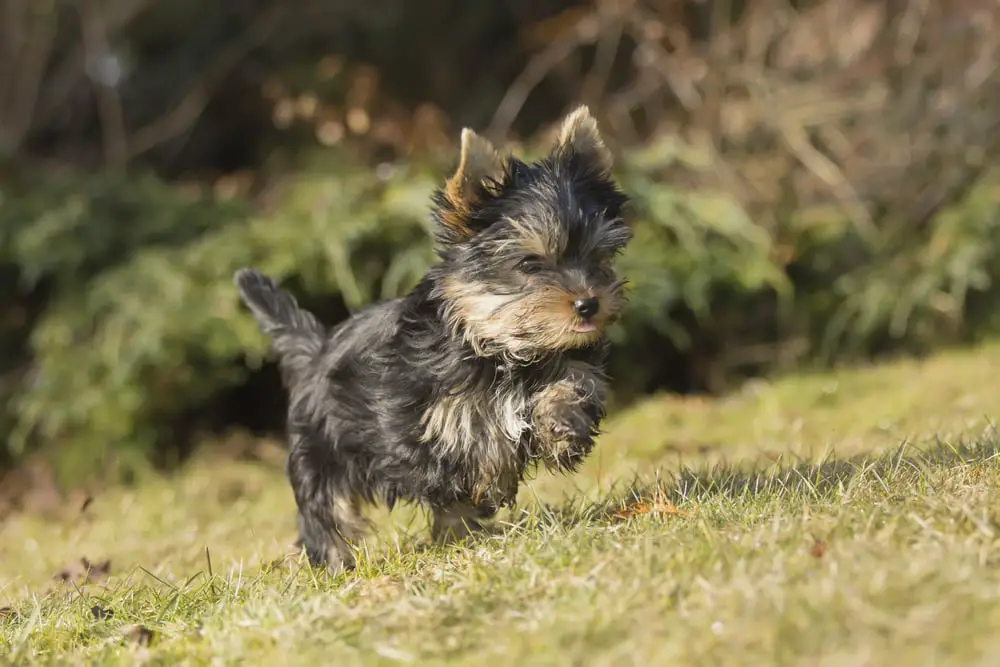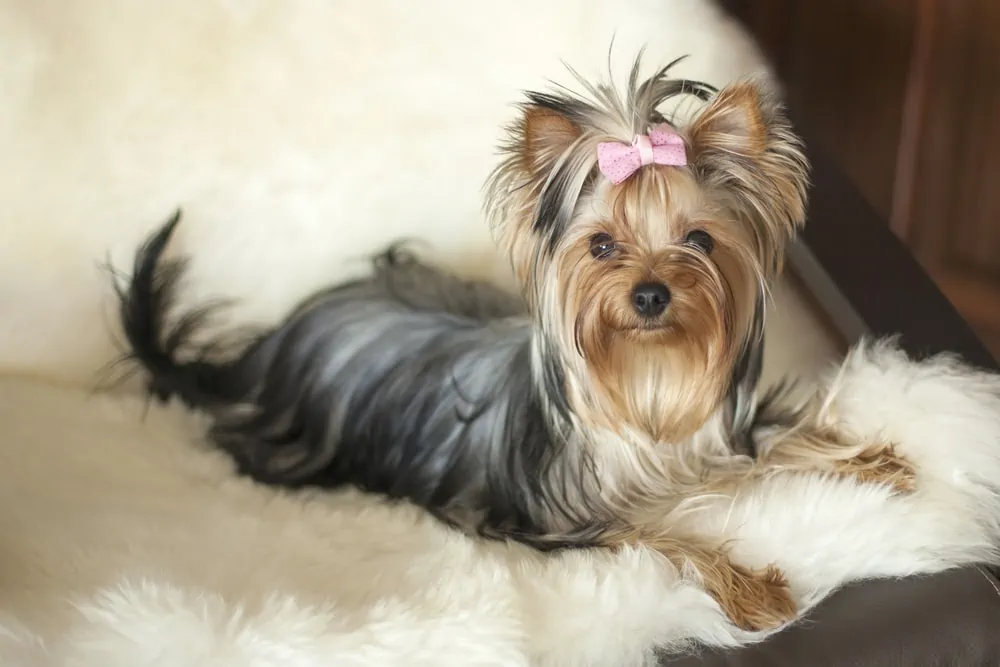Most dog lovers in the suburbs would love to keep as many dogs as possible, but finding the right dog for their environment is vital.
Sandra thinks that she’s ready for another dog in her household and her favorite book, The Wizard of Oz, has given her an idea.
Toto, Dorothy’s loyal canine companion, is described in the books as a “little black dog with long silky hair” which perfectly matches the description of Yorkshire terriers, a popular dog breed during the 1900s when the book was released.
Sandra is inspired to find her own little Toto, a perfect fit for her suburban home.
What is a Silverback Yorkie? A Silverback Yorkie, also known as a Yorkshire terrier, is a small and energetic dog breed. While Yorkshire terriers come in a range of colors, the Silverback Yorkies are named as such due to their steel-blue and tan coat. The Silverback Yorkie belongs to the toy group of dogs, due to its diminutive stature and weight.
The Silverback Yorkie is a popular dog breed but there is a lot more to this little bundle of energy than meets the eye (source).
History of the Silverback Yorkie

Originally, Silverback Yorkies were associated with the working class and only in the last century did they become more popular.
They remain popular to this day, with the American Kennel Club (AKC) ranking it 10th out of 191 breeds (source).
Yorkshire terriers originated in England in the 19th Century and the foundation of the Silverback Yorkie came from a mix of Scottish and English terriers, with Maltese added to the gene pool to contribute to the Yorkie’s silky coat.
Originally the dog breed was called Broken-haired Scotch terrier but by 1970, the name changed to Yorkshire terrier.
Since Yorkshire terriers were known for their rat-catching abilities, the dogs first began working in mines and mills to control vermin but eventually became a fashionable pet in the 1960s.
Huddersfield Ben, born in 1865, is often considered the true sire of the breed. Huddersfield Ben won many prizes at dog shows and was known for his vermin-catching capabilities.
A direct descendent of Huddersfield Ben, Bradford Harry, became a champion at the AKC in 1889 and cemented the breed’s popularity in the U.S.
Yorkshire terriers are still quite popular today, especially for people who prefer small and intelligent dogs.
Physical and Behavioral Aspects of a Silverback Yorkie
Yorkshire terriers are an active and fun-loving breed of dog. Despite their small size, they are extremely energetic.
Physical Aspects
| Height and Weight | 6-7 inches (15-17 ½ cm)7 pounds (3.2 kg) |
| Head | Yorkies have a flat skull with a short snout and a completely level bite that is neither an underbite or an overbite. Their nose, lips, and eyes should be dark. Their ears should be V-shaped and always erect. |
| Body | The body is short, flat and muscular. |
| Legs and Feet | Both the front and back legs should face forwards, with no turning in or out. The feet should be rounded with black toenails. |
| Coat | The coat should be long and glossy with straight hair that does not wave or curl. The texture of the fur should be very fine. |
| Color | Generally, Yorkshire terriers are born with a mix of black and tan coloration. As they grow older, the colors should completely separate and the tan color should remain on the face and neck, while a steel-blue color emerges on the body. Silverback Yorkies are an uncommon type of Yorkshire terrier in which the blue color lightens further, resembling silver more than a steel blue (source) |
Temperament
The American Kennel Club has described the breed as “affectionate, sprightly and tomboyish” (source). Even though Yorkies are a small breed, they are highly energetic and adventurous.
They are curious by nature and are alert to changes in the environment, making them loud alarm bells in case of intruders or strangers.
They are loyal to a fault and can be distrustful of strangers. A Yorkie can be a demanding dog, they require strong owners who will show the dog who’s the leader.
Since Yorkies are hunting dogs, they are bold and tenacious. They are able to commit to an activity for hours on end if it is something that interests them.
Their confidence can get the Yorkie into trouble as it may attempt to fight a dog much bigger. It is up to the owner to protect the dog if it gets into fights which it cannot win.
Yorkies are also incredibly smart dogs and are able to understand a multitude of commands, along with associations and patterns in their day-to-day lives.
They love being praised for their good behavior. Their stubbornness may make it a little more difficult to train them but through love and care, they can become obedient dogs for the most part.
Their training should be more positive, as they learn more through praise and treats rather than punishment or harsh treatment.
A Yorkshire terrier does not simply walk; it runs, skips and jumps. It can be prone to barking at the slightest disturbance but a well-trained Yorkie is an excellent watchdog, even though it may not be able to fight off an attacker.
A Yorkie can also be trained to be an independent dog that may want to remain close to an owner without demanding attention.
Yorkshire terriers are generally not good pets alongside other animals unless they grow up alongside them or attend behavioral training classes.
They can tolerate other Yorkies but they do not seem to realize how small they are and will often attempt to fight with bigger animals, increasing the chances of them being injured.
Owner and Environment Needs
Yorkshire terriers are best for households with older children. Since the dog is energetic and a natural alpha, the onus is on the owner to control and train the dog with love, understanding and a firm hand.
If the Yorkshire terrier is allowed to do as it wishes, it becomes too demanding, bossing the owners for attention and may show aggression towards strangers and unknown animals.
Yorkies are loving and gentle dogs, and owners just need to know how to manage them.
Since younger children may not know how to play with a Yorkie, older children are preferred as Yorkies can snap if they are surprised or teased. They also like to bark and have to be trained out of the habit.
Yorkies generally prefer more open spaces, so suburbs are a good place to raise them.
However, they can live in apartments too if owners can make the commitment to take them out for frequent walks and play with them often indoors.
They are known to be easy to train, although they can be stubborn at the time and can difficult to housebreak. They also make excellent watchdogs.
Caring for a Silverback Yorkie

Looking after a Silverback Yorkie is similar to looking after any other dog, but they do require some specific care unique to their breed.
Health
Since Yorkshire terriers are so small, there are risks associated with their miniature sizes, such as broken bones from falls, knocks or large jumps. Some Yorkies have fragile bones which makes them more prone to injuries.
Yorkies also have a delicate digestive system and need to be fed differently from a larger dog. They need to be fed small, frequent meals to keep their blood sugar levels up.
If they become hypoglycaemic, they can become weak, show signs of clumsiness and may even begin vomiting.
Early tooth decay is also an issue that Yorkies can suffer from. A way to combat this is to brush their teeth often and give them dry food to remove plaque and keep their teeth healthy (source).
Yorkies can also suffer from Bronchitis and are sensitive to the cold; therefore, some extra care should be taken during winter.
When a Yorkie is pregnant, the average litter size is about 4 puppies but due to their size, they often need a cesarean to give birth as a natural birth can be harmful to the mother.
Costs
There are certain costs that are associated with keeping a Yorkie as a pet, some unique to the breed and some related to keeping a dog as a pet in general.
First, a Yorkshire terrier bought from a shelter or animal rescue will be cheaper compared to one bought from a breeder, which can cost more than $1000.
On the other hand, a breeder may have started training the puppy and it may have been given all of its shots and been neutered.
Depending on where you live, you may also be expected to have a dog license, which could be a once-off cost or a yearly fee.
Secondly, food for a Yorkie is actually cheaper than food for bigger dogs, as they do not eat as much. Pet insurance is vital for any pet, but more so for a Yorkie that may be prone to certain diseases or injuries.
Since Yorkies require a good amount of grooming, an owner should be ready to buy the supplies themselves or budget for frequent visits to the groomer. Yorkshire terriers will also need grooming for their nails.
If a Yorkie is being brought into a household that includes other dogs, it is vital that they are sent for behavioral classes to help them socialize with other dogs.
Obedience classes may also be necessary if some negative behaviors have emerged.
Allergies
Yorkies are considered to be an excellent dog for people with allergies. Since the coat is a hair and not fur, it does not exacerbate allergies. Since Yorkies do not shed a lot, this can also help those with allergies.
The dogs themselves can have allergic reactions to certain chemicals in products, so it is important to look for signs that the dog is irritated by a product.
Symptoms of allergies include scratching of the hair or skin, hair loss, spots of flaky or red skin, along with a constant rubbing of the head or body against objects.
Coat Care
Due to its long coat, a Yorkie requires a lot of grooming. They do not shed much, except when they’re growing out of their puppy fur. A special brush is usually required to detangle they’re fine coat only a daily basis if you choose to keep their hair long.
The dog’s coat is quite similar to human hair (source) and because the dog does not have an undercoat, its shedding is kept to a minimum. This also makes it easier to bathe the dog compared to other breeds.
A Yorkies’ coat should never be shaved as it provides vital protection against the weather but it is recommended that they wear sweaters during extremely cold weather.
Yorkies should be washed at least three times a week, especially with longer hair.
If you choose to keep the dog’s hair long, fasteners should be used to keep the hair out of the dog’s face, which could lead to tangling or irritation of the eye.
Possible Genetic Defects
While Yorkshire terriers are known as strong, healthy dogs, they are prone to some medical issues. As mentioned before, they are sensitive to the cold and can develop bronchitis easily.
They can also suffer from herniated disks that cause paralysis in the hindquarters
They also have a higher chance of liver shunt, which is a birth defect in which an abnormal connection of veins allows blood to bypass the liver. This requires medical attention and there is no guaranteed success.
Silverback Yorkies can also be afflicted by loose knee joints, which causes the kneecap to pop out of place.
This could be inherited or be the result of an injury. While Yorkies generally have straight legs that face forward, injuries or bad posture could lead to leg deformities in which their feet face outward.
This can be highly painful for the dog. Since Yorkshire terriers also have a poor tolerance for anesthesia, it makes surgeries a little more difficult.
Life Expectancy
A Yorkie generally has a life expectancy of about 12-15 years. They are known as hearty and healthy dogs for the most part, but it is vital for new owners to buy from reputable breeders to ensure that the puppy is healthy.
If buying from a shelter, ask a veterinarian to have a look at the Yorkie for any health complications before committing to your new animal. This can save you from future pain and heartbreak.
It is not recommended to purchase a “teacup” Yorkie, which is a specially bred dog that can suffer from a myriad of health issues due to irresponsible breeding.
“Teacup” Yorkies are even more likely to suffer from the same health issues as bigger Yorkies but these are exacerbated to their size.
Differences Between Male and Female Yorkies
| Male | Female |
| Generally bigger in size and weigh more | Smaller in size and weigh less. |
| Aggressive and independent | Less aggressive (unless giving birth) and more dependent |
| Forms a close bond with one person | Bonds with many people |
| Develops faster sexually | Develops slower sexually |
| Can become possessive of female partner | Not particularly possessive of male partner |
| Does not socialize well with other males | Can socialize well with male dogs but may fight with female dogs initially, until a hierarchy is developed |
| Requires more exercise as they are more active | Does not require as much exercise |
| More difficult to train and quite stubborn | Easier to train but can be sensitive to harsh treatment |
Similar Breeds
Yorkshire Terriers share some features with other toy dogs, like the Maltese with their similar hair textures and lengths. The Maltese is assumed to be bred with Terriers to give them their long silky hair.
The Silky Terrier is often mistaken to be a Silverback Yorkie due to their similar features.
An easy way to tell them apart is by the shape of their heads, where the Silky has a wedge-shaped head compared to the rounded head of the Yorkie.
Silky Terriers also have stouter bodies and generally weigh more than their diminutive cousin. (source)
Related Content: The Rat Terrier Border Collie Mix: Is it the Right Dog for You?
Final Thoughts
The Yorkshire terrier can be a lovely dog to have, but prospective owners like Sandra have to consider several points before deciding to commit to a new little Toto.
As with all dogs, Yorkies require years of commitment and love.
Some other final considerations include how much time can be given to a new dog, whether the dog will be able to socialize with other pets, and a willingness to train and love the dog.
It is also important to think about how neighbors might react to a loud dog and how often people visit the home, especially those with young children.
Still, with these dogs being the loving, loyal and spunky animals that they are, Sandra thinks that she is ready for her first Silverback Yorkie.


0 Comments